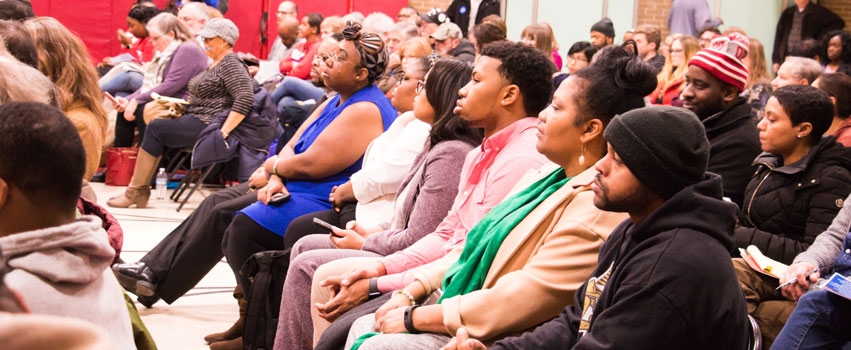Bringing Back the Whiskey City
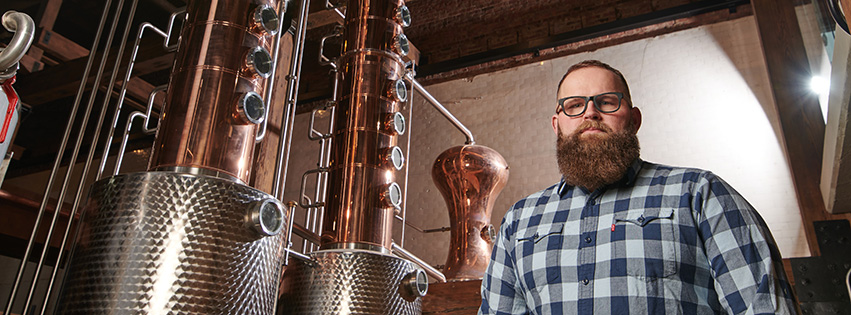
“Peoria has such a rich distilling heritage, but it was robbed from us by Prohibition. It’s a tragedy that the ‘Whiskey City’ lacked a whiskey distillery for so many decades.”
Chris Ober is about to remedy that. Black Band Distillery is expected to open this March to make up for lost time—precisely one century from the ratification of the 18th Amendment. Located in Peoria’s Warehouse District, it will be much more than fine whiskey, spirits and food. Black Band Distillery will offer a layered experience for patrons, in terms of the distilling and ambiance.
To be sure, Chris Ober is an engaged and committed Peorian. Born and raised in the city, he graduated from Dunlap High School. His resume includes stints at International Supply Co. in Edelstein, Peoria County Sheriff’s Department as an auxiliary officer, Peoria Park Police in their mounted unit and later patrol division, and then Caterpillar. He left there to open a Jimmy John’s sandwich shop and today is director of operations for six restaurant locations in Peoria. He and his wife Erin are raising their family in Peoria as well, with a son (6) and daughter (3), and one on the way this February.
“Prohibition deprived Peoria of its main industry, since one out of three people worked in or supported the distilling industry. What was really lost was our culture and our identity.”
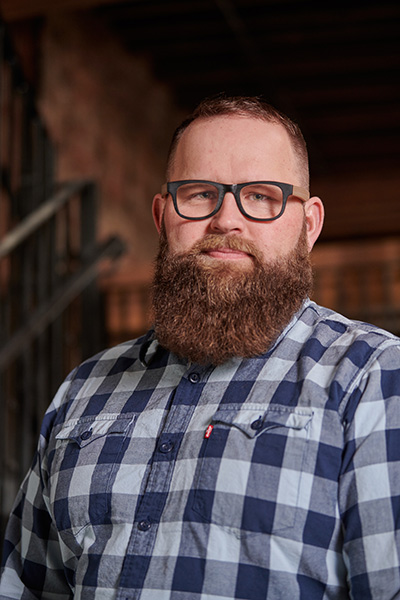
Fifteen years ago, Chris found a calling and began looking into distilling in earnest. Starting with The Alaskan Bootleggers Bible, he plowed through various books, only to discover there were surprisingly few written on the subject. With his interest now piqued, and equipped with some basic knowledge, he was eager to take the next step to get some training and applied experience.
However, this presented a challenge. Peoria is nowhere near Kentucky, Ireland, Scotland, or any other great “home” of whiskey; nearby opportunities were limited to entry-level bottling or cleaning positions. Eventually Chris came across Kothe Distilling Technologies in Chicago and a training opportunity with Dr. Robert Birnecker, a highly respected industry expert. At Kothe he learned about milling grain, yeast, enzymes, fermentation, making “cuts” (when to collect or stop collecting distillate), aging and barrel types, amount of char, and finishing techniques, as well as some of the business aspects of distilling: batch costs, labeling, bottling, etc.
When Dr. Birnecker mentioned they offer one-on-one training as well, Chris asked to be considered for that opportunity. After completing the first class, he returned as an apprentice in one-on-one consulting. It was then that he was able to gain hands-on experience, learning even more about such things as high-quality water, organic grains, unique grains, and sustainable food systems produced by non-industrial organic farms. He also learned about the production of liqueurs, an alcoholic drink composed of distilled spirits and additional flavorings such as sugar, fruits, herbs and spices. With several high-quality fruit growers in central Illinois, Chris anticipates that Black Band Distillery will also showcase their own liqueurs, in addition to whiskey, gin and vodka.
Shortly after his experience at Kothe, the Siebel Institute of Technology—the oldest brewing school in the nation—offered a new program for craft distillery operations. Chris headed to Chicago once again to attend the program. Completing it provided him with a more advanced understanding of distilling as a business, as well as a greater grasp of controlling recipes and checking yields.
“It was really important to have a very specific look to the distillery. Many distilleries open in big, cold warehouses. I wanted something more unique.”
For a decade, Chris thought about opening a distillery in Peoria—the Whiskey City. Then in 2017, he made the decision to open Black Band Distillery. His next challenge was to find a facility that provided at least 25-foot ceilings, exposed brick and heavy timbers. He ultimately settled on a building with 32-foot ceilings and precisely the “original” aesthetics he required.
In the documentary Scotch: A Golden Dream, a handful of master distillers are asked, “What’s the best dram?” They all remark that a spirit should taste good and be made well—and needn’t cost a fortune. But they also point out that, in a way unlike beer or wine, the circumstances of the moment and the place itself can dramatically affect the taste, nose and feel of a spirit. They suggest that “best” is less about the flavor of a drink, and more about the experience.
Chris Ober clearly appreciates this understanding. He insists that when patrons visit Black Band Distillery, they are experiencing the spirit of the time and feel of the place that once was during Peoria’s long-ago whiskey reign. The building he acquired was built circa-1900 and required extensive demolition and renovations to arrive at its very specific, contemporary look and feel. Elements of the distillery are designed to allow for a communal experience, so food and drinks can be shared among old friends and family—or with new friends met right there.
Aside from wood and masonry, the interior design and fixtures needed to fit neatly into Chris’ vision. Ever the perfectionist, he researched American-made products for lighting and ultimately selected Bevolo (New Orleans, LA), which produces the best period gas lanterns in the world, for the storefront and patio. He chose custom fixtures with hand-blown glass from Olde Brick Lighting (Lititz, PA) for the interiors. Likewise, the building will feature original Purington pavers from Peoria Public Works in the two-level outdoor area: the very same bricks used in the streets of Peoria just prior to Prohibition.
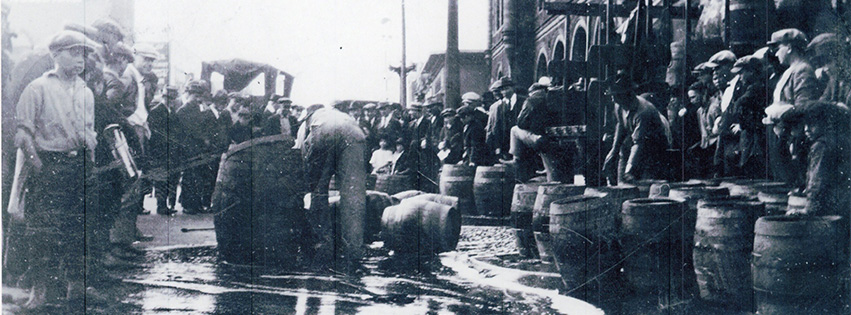
“Of course, whiskey is the focus.”
The romance of the space and décor at Black Band Distillery is vital, and so too are the layered and evolving experiences of drinks and food. These offerings will be unlike anything in central Illinois. In fact, the bitters and syrups used to build the cocktail menu will be produced in-house, as well as the spirits. In addition, they will offer classes for making cocktails, bitters and syrups, and even apprenticeships—Chris is intent on providing educational opportunities in distilling here in Peoria.
Of course, whiskey is the focus. Chris is committed to supporting a sustainable food system by sourcing grains from non-industrialized organic farms—not only because he feels it’s the right thing to do, but because Illinois farmers produce some of the finest organic grain and maize in the world. These ingredients, and the producers themselves, will be showcased through Black Band whiskeys and spirits.
Chris also expects to broaden the tasting experience with different types of sprits, such as eau de vie featuring pears and apples produced in central Illinois. This area has the perfect grains for producing ultra-high-quality vodka that retains flavor from the grain itself. He wants to create opportunities for food pairings with more complex vodkas that allow actual flavors to be drawn out of the vodka. Likewise, Black Band Distillery will be making a variety of gins, ranging from the typical juniper/coriander-forward to citrus, floral and honey-forward.
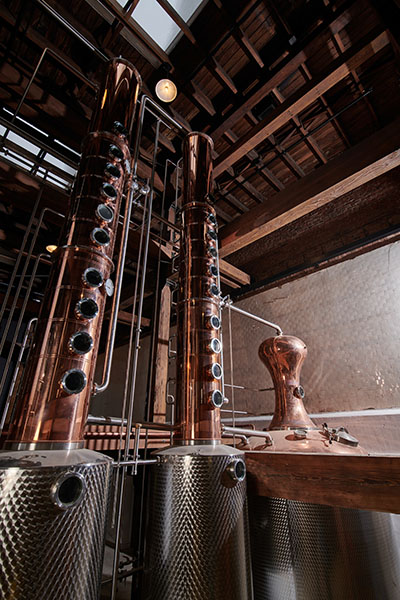
“The architect has his work cut out for him.”
With Chris’ sharp attentiveness to detail, his partners and contractors needed to be strongly committed to working in lockstep with him. Design/construction in general was a challenge, not only from an age standpoint or adherence to the period, but also to accommodate installation of the distilling equipment. The building is quite old, so the mechanical and electrical work was daunting. And being the first distillery in Peoria for so many decades, there were concerns and pressures with respect to faithfulness in design, proper functionality, occupancy, safety, and many other items that needed to be addressed for City codes.
The Black Band team included Farnsworth Group as the architect/engineer and P.J. Hoerr as the general contractor. Other contractors included Elite Painting, Dries Plumbing, Zeller Electric, PIPCO, Montefusco, East Moline Glass and Midwest Applied Solutions. First Mid Bank & Trust was the banking/financing partner.
First adopted in 1770s England as a sign of mourning or loss, the tradition of the black armband remains in use today in Western culture.
For Peoria, losing its identity as the “Whiskey Capital of the World” in 1920 was a tremendous and total loss. Black Band Distillery serves to recognize and rectify that loss, while memorializing Peoria’s history. When it opens at 1000 SW Adams in March 2020, Chris Ober will be leading the distillery operations. Savannah Hattan will be general manager of the bar/restaurant and create the cocktail menu. A chef partner will be announced at a later date. They have plans to distribute product statewide, but for now remain focused on sharing their great passion for the distilling experience with Peoria and all of central Illinois. PM
